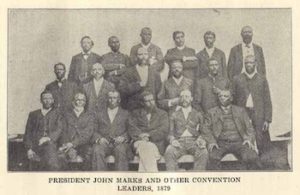
*On this date in 1830, the first National Negro Convention was held. Taking place in Philadelphia, this was a movement to address the hostility, discrimination, exclusion, and violence against blacks by whites in northern cities.
In the early months of 1830, a young, freed black man from Baltimore named Hezekiah Grice was not satisfied with life in the North because of the "hopelessness of contending against oppression in the United States." Grice wrote to several Black leaders asking if freedmen should emigrate to Canada and for a convention. The first National Negro Convention was held in September, and forty black Americans from nine states attended. Of all the delegates present, only two, Elizabeth Armstrong and Rachel Cliff were women.
The aim of this organization was two-fold: First, it was to encourage Black families with children to move to Canada. Second, the organization wanted to improve the livelihood of Black Americans remaining in the United States. As a result of the meeting, Black leaders from the Midwest organized to protest not only against enslavement but also against racial discrimination. Leaders such as Bishop Richard Allen were also present.
During the convention meeting, Allen argued against colonization but supported emigration to Canada. By the end of the ten-day session, Allen was named President of a new organization, the American Society of Free People of Color, for improving their condition in the United States, for purchasing lands, and for establishing a settlement in the Province of Canada. During the first ten years of the convention meetings, black and white abolitionists collaborated to find effective ways to deal with racism and oppression in American society.
The convention movement was symbolic of freed blacks and marked the significant growth in black activism during the 19th century. By the 1840s, black activists were at a crossroads. While some were content with the moral suasion philosophy of abolitionism, others believed this school of thought was not heavily influencing pro-slavery supporters to change their practices. At the 1841 convention meeting, conflict was growing among attendees—should abolitionists believe in moral persuasion or moral persuasion followed by political action?
Many, such as Frederick Douglass, believed that moral persuasion must lead to political action. As a result, Douglass and others became followers of the Liberty Party. With the passage of the Fugitive Slave Law of 1850, convention members agreed that the United States would not be morally persuaded to give blacks in America justice. The last convention movement was held in Syracuse, New York, in 1864. Delegates and leaders felt that Black citizens could participate in the political process with the passage of the Thirteenth Amendment.